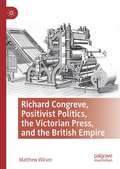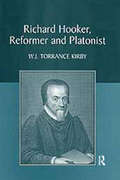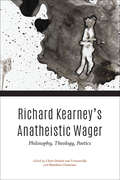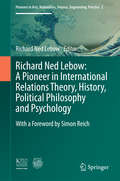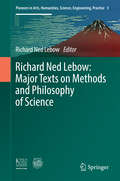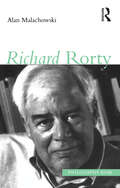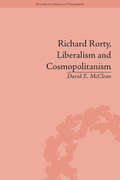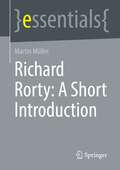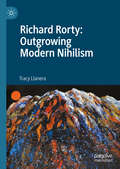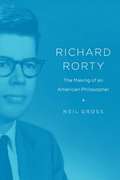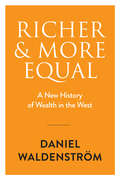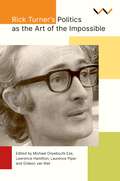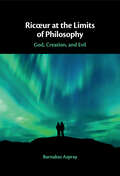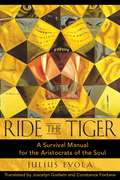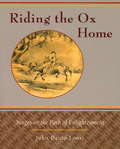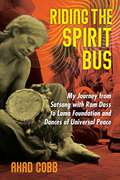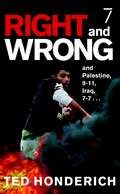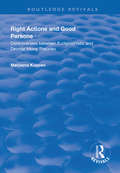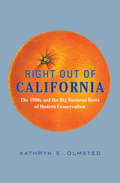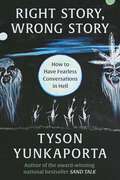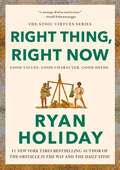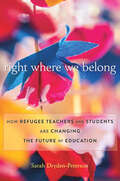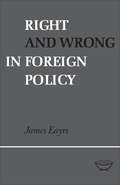- Table View
- List View
Richard Congreve, Positivist Politics, the Victorian Press, and the British Empire
by Matthew WilsonThis book is about the life and times of Richard Congreve. This polemicist was the first thinker to gain instant infamy for publishing cogent critiques of imperialism in Victorian Britain. As the foremost British acolyte of Auguste Comte, Congreve sought to employ the philosopher’s new science of sociology to dismantle the British Empire. With an aim to realise in its place Comte’s global vision of utopian socialist republican city-states, the former Oxford don and ex-Anglican minister launched his Church of Humanity in 1859. Over the next forty years, Congreve engaged in some of the most pressing foreign and domestic controversies of his day, despite facing fierce personal attacks in the Victorian press. Congreve made overlooked contributions to the history of science, political economy, and secular ethics. In this book Matthew Wilson argues that Congreve’s polemics, ‘in the name of Humanity’, served as the devotional practices of his Positivist church.
Richard Hooker, Reformer and Platonist
by W.J. Torrance KirbyThis book explores key aspects of Richard Hooker's philosophical and theological discourse in the context of currents of thought prevalent in the 'Magisterial Reformation' of the sixteenth century. Hooker's treatment of natural law, his dependence upon the philosophical discourse and traditional cosmology of Christian Neoplatonism, and his appeal to the authority of patristic sources, are all closely examined. Challenging the received 'exceptionalist' model of much of the twentieth-century interpretation of Hooker, in particular the concept of his supposed defence of the English Reformation as striking a 'via media' between Rome and mainstream Protestant reform, W.J. Torrance Kirby argues that Hooker adheres to principles of 'magisterial' reform while building upon the assumptions of a distinctively Protestant version of Platonism.
Richard Kearney's Anatheistic Wager: Philosophy, Theology, Poetics (Indiana Series in the Philosophy of Religion)
by Chris Doude van Troostwijk Matthew ClementeThis anthology of fifteen essays provides a variety of critical perspectives on the influential ideas in Richard Kearney’s Anatheism.Blaise Pascal famously insisted that it was better to wager belief in God than to risk eternal damnation. More recently, the distinguished philosopher Richard Kearney has offered a wager of his own—the anatheistic wager, or return to God after the death of God. In this volume, an international group of contributors consider what Kearney’s spiritual wager means.This volume examines what is at stake with such a wager and what anatheism demands of the self and of others. The essays explore the dynamics of religious anatheistic performativity, its demarcations and limits, and its motives.A recent interview with Kearney focuses on crucial questions about philosophy, theology, and religious commitment. As a whole, this volume interprets and challenges Kearney’s philosophy of religion and its radical impact on contemporary views of God.
Richard Ned Lebow: A Pioneer in International Relations Theory, History, Political Philosophy and Psychology
by Richard Ned LebowThis is the first of four volumes to be published as part of this book series, on the life and work of Richard Ned Lebow. In a career spanning six decades, Richard Ned Lebow has made important contributions to the study of international relations, political and intellectual history, motivational and social psychology, philosophy of science, and classics. He has authored, coauthored or edited 30 books and almost 250 peer-reviewed articles. These four volumes are excerpts from this corpus. The first volume includes an intellectual autobiography, bibliography, and assessments of Lebow's contributions to diverse fields by respected authorities. It shows how a scholar's agenda evolves in response to world events and his efforts to grapple with them theoretically and substantively. It elaborates pathways for addressing these events and their consequences in an interdisciplinary manner, and offers new concepts and methods for doing so. Richard Ned Lebow (USA) is Professor of International Political Theory in the Department of War Studies, King's College London and James O. Freedman Presidential Professor Emeritus at Dartmouth College and also a Bye-Fellow of Pembroke College, University of Cambridge He has taught strategy and the National and Naval War Colleges and served as a scholar-in-residence in the Central Intelligence Agency during the Carter administration. He held visiting appointments at the University of Lund, Sciences Po, University of Cambridge, Austrian Diplomatic Academy, Vienna, London School of Economics and Political Science, Australian National University, University of California at Irvine, University of Milano, University of Munich and the Frankfurt Peace Research Institute. He has authored and edited 30 books and nearly 250 peer reviewed articles. Contributors to the book are: Simon Reich - Mervyn Frost - Janice Gross Stein - Stefano Guzzini - Markus Kornprobst - Harald Müller - Christian Wendt - Robert English.
Richard Ned Lebow: Major Texts on Methods and Philosophy of Science
by Richard Ned LebowThis book about the philosophy of science is the second out of four volumes by Richard Ned Lebow in this book series. It not only provides a useful overview of this broad topic, but also provides deeper insight into specific topics like the philosophy of science causation, epistemology and methods, and especially on counter factual analysis.
Richard Rorty (Sage Masters In Modern Social Thought Ser.)
by Alan MalachowskiRichard Rorty is notorious for contending that the traditional, foundation-building and truth-seeking ambitions of systematic philosophy should be set aside in favour of a more pragmatic, conversational, hermeneutically guided project. This challenge has not only struck at the heart of philosophy but has ricocheted across other disciplines, both contesting their received self-images and opening up new avenues of inquiry in the process. Alan Malachowski provides an authoritative overview of Rorty's considerable body of work and a general assessment of his impact both within philosophy and in the humanities more broadly. He begins by explaining the genesis of Rorty's central ideas, tracking their development from suggestions in his early papers through their crystallization in his groundbreaking book, "Philosophy and the Mirror of Nature". Malachowski evaluates some of the common criticisms of Rorty's position and his ensuing pragmatism. The book examines the subsequent evolution of his ideas, focusing particularly on the main themes of his second major work, Contingency, Irony, and Solidarity. The political and cultural impact of Rorty's writings on such diverse fields as feminism, cultural and literary theory, and international relations are also considered, and the author explores why Rorty's work has generally found its warmest reception in these areas rather than among mainstream philosophers.
Richard Rorty, Liberalism and Cosmopolitanism (Routledge Studies in American Philosophy #2)
by David E McCleanRichard Rorty was one of the most controversial and influential philosophers of the late twentieth century. McClean re-evaluates Rorty’s work in the light of his liberal cosmopolitan outlook, showing how it can be applied to a range of social and political issues.
Richard Rorty: A Short Introduction (essentials)
by Martin MüllerThe essential offers a systematic guide to a fruitful reading of Rorty. At the same time, it provides a brief introduction to the main features of Richard Rorty's neopragmatism. The author proposes to read it as a fragile balance of pragmatism and romanticism by which Rorty seeks to change our self-image. Moreover, he elucidates this transformative ambition through a sketch of "continence, irony, and solidarity" and the utopian figure of the liberal ironist. The essential concludes with a reference to Rorty's hitherto unrecognized ethico-political motivation and with a methodological suggestion for further reading of his texts: One must apply the pragmatist method to himself.
Richard Rorty: Outgrowing Modern Nihilism
by Tracy LlaneraThe book makes a new contribution to the contemporary debates on nihilism and the sacred. Drawing on an original interpretation of Richard Rorty’s writings, it challenges the orthodox treatment of nihilism as a malaise that human beings must overcome. Instead, nihilism should be framed as a problem for human culture to outgrow through pragmatism.
Richard Rorty: The Making of an American Philosopher
by Neil GrossOn his death in 2007, Richard Rorty was heralded by the New York Times as “one of the world’s most influential contemporary thinkers. ” Controversial on the left and the right for his critiques of objectivity and political radicalism, Rorty experienced a renown denied to all but a handful of living philosophers. In this masterly biography, Neil Gross explores the path of Rorty’s thought over the decades in order to trace the intellectual and professional journey that led him to that prominence. The child of a pair of leftist writers who worried that their precocious son “wasn’t rebellious enough,” Rorty enrolled at the University of Chicago at the age of fifteen. There he came under the tutelage of polymath Richard McKeon, whose catholic approach to philosophical systems would profoundly influence Rorty’s own thought. Doctoral work at Yale led to Rorty’s landing a job at Princeton, where his colleagues were primarily analytic philosophers. With a series of publications in the 1960s, Rorty quickly established himself as a strong thinker in that tradition-but by the late 1970s Rorty had eschewed the idea of objective truth altogether, urging philosophers to take a “relaxed attitude” toward the question of logical rigor. Drawing on the pragmatism of John Dewey, he argued that philosophers should instead open themselves up to multiple methods of thought and sources of knowledge-an approach that would culminate in the publication of Philosophy and the Mirror of Nature, one of the most seminal and controversial philosophical works of our time. In clear and compelling fashion, Gross sets that surprising shift in Rorty’s thought in the context of his life and social experiences, revealing the many disparate influences that contribute to the making of knowledge. As much a book about the growth of ideas as it is a biography of a philosopher, Richard Rorty will provide readers with a fresh understanding of both the man and the course of twentieth-century thought.
Richer and More Equal: A New History of Wealth in the West
by Daniel WaldenströmOnce there were princes and peasants and very few between. The extremes of wealth and poverty are still with us, but that shouldn't blind us to the fact our societies have been utterly transformed for the better over the past century. As Daniel Waldenström makes clear in this authoritative account of wealth accumulation and inequality in the modern west, we are today both significantly richer and more equal. Using cutting-edge research and new, sometimes surprising, data, Waldenström shows that what stands out since the late 1800s is a massive rise in the size of the middle class and its share of society’s total wealth. Unfettered capitalism, it seems, doesn’t have to lead to boundless inequality. The key to progress was political and institutional change that enabled citizens to become educated, better paid, and to amass wealth through housing and pension savings. Waldenström asks how we can consolidate these gains while encouraging the creation of new capital. The answer, he argues, is to pursue tax and social policies that raise the wealth of people in the bottom and middle rather than cutting wealth of entrepreneurs at the top. Richer and More Equal is a benchmark account of one of the most profound and encouraging social changes in human history and a blueprint for continued progress.
Rick Steves Travel as a Political Act
by Rick StevesTravel connects people with people. It helps us fit more comfortably and compatibly into a shrinking world, and it inspires creative new solutions to persistent problems facing our nation. We can't understand our world without experiencing it. Rick Steves Travel as a Political Act helps us take that first step.There's more to travel than good-value hotels, great art, and tasty cuisine. Americans who "travel as a political act" can have the time of their lives and come home smarter-with a better understanding of the interconnectedness of today's world and just how our nation fits in.In the second edition of this award-winning book, acclaimed travel writer Rick Steves explains how to travel more thoughtfully-to any destination. With updated information on Europe, Central America, and Asia; an expanded discussion of the Middle East; and a brand-new chapter on the Holy Land that covers Israelis and Palestinians today, Rick shows readers how his travels have shaped his politics and broadened his perspective.The royalties from the sale of this edition will be donated by Rick Steves to Bread for the World, a Christian organization working to end hunger around the world.
Rick Turner's Politics as the Art of the Impossible
by Crain Soudien Ayesha Omar Billy Keniston Michael Onyebuchi Eze Lawrence Hamilton Laurence Piper Gideon van Riet Paula Ensor Daryl Glaser Christine Hobden John Sodiq Sanni Tendayi SitholeRevisits the work of Rick Turner, a South African political theorist, and addresses contemporary debatesRick Turner was a South African academic and anti-apartheid activist who rebelled against the apartheid state at the height of its power. For this he was assassinated in 1978, at just 32 years of age, but his life and work are testimony to the power of philosophical thinking for humans everywhere. Turner chose to live freely in an unfree time and argued for a non-racial, socialist future in a context where this seemed unimaginable.This book takes seriously Rick Turner’s challenge that political theorising requires thinking in a utopian way. Turner’s seminal book The Eye of the Need: Towards a Participatory Democracy laid out some of his most potent ideas on a radically different political and economic system. His demand was that we work to escape the limiting ideas of the present, carefully design a just future based on shared human values, and act to make it a reality, both politically and in our daily lives.The contributors to this volume engage critically with Turner’s work on race relations, his relationship with Steve Biko, his views on religion, education and gender oppression, his participatory model of democracy, and his critique of enduring forms of poverty and economic inequality. They show how, in his life and work, Turner modeled how we can dare to be free and how hope can return, as the future always remains open to human construction. This book makes an important contribution to contemporary thinking and activism where the need for South Africans to define their understanding of their greater common good is of crucial importance.
Ricœur at the Limits of Philosophy: God, Creation, and Evil
by Barnabas AsprayCan finite humans grasp universal truth? Is it possible to think beyond the limits of reason? Are we doomed to failure because of our finitude? In this clear and accessible book, Barnabas Aspray presents Ricœur's response to these perennial philosophical questions through an analysis of human finitude at the intersection of philosophy and theology. Using unpublished and previously untranslated archival sources, he shows how Ricœur's groundbreaking concept of symbols leads to a view of creation, not as a theological doctrine, but as a mystery beyond the limits of thought that gives rise to philosophical insight. If finitude is created, then it can be distinguished from both the Creator and evil, leading to a view of human existence that, instead of the 'anguish of no' proclaims the 'joy of yes.'
Ride the Tiger: A Survival Manual for the Aristocrats of the Soul
by Joscelyn Godwin Julius Evola Constance FontanaJulius Evola’s final major work, which examines the prototype of the human being who can give absolute meaning to his or her life in a world of dissolution• Presents a powerful criticism of the idols, structures, theories, and illusions of our modern age• Reveals how to transform destructive processes into inner liberationThe organizations and institutions that, in a traditional civilization and society, would have allowed an individual to realize himself completely, to defend the principal values he recognizes as his own, and to structure his life in a clear and unambiguous way, no longer exist in the contemporary world. Everything that has come to predominate in the modern world is the direct antithesis of the world of Tradition, in which a society is ruled by principles that transcend the merely human and transitory.Ride the Tiger presents an implacable criticism of the idols, structures, theories, and illusions of our dissolute age examined in the light of the inner teachings of indestructible Tradition. Evola identifies the type of human capable of “riding the tiger,” who may transform destructive processes into inner liberation. He offers hope for those who wish to reembrace Traditionalism.
Riding the Ox Home: Stages on the Path of Enlightenment
by John Daido Loori"Maps and guideposts are helpful when we undertake a journey. The ten Ox-Herding Pictures, the accompanying ancient poems, and a modern commentary by John Daido Loori, sketch the spiritual path encountered in Zen training, a path of exhaustive study of the self and the realization of the ultimate nature of reality. The Ox-Herding Pictures can be our companion on the Way of self-discovery, our compass and perspective when we need one. They are a bottomless source of mysterious wisdom to which we can return again and again for inspiration, and they translate easily into the gritty reality of spiritual practice that emerges from and grounds us in the inescapable relevance of our daily lives.
Riding the Spirit Bus: My Journey from Satsang with Ram Dass to Lama Foundation and Dances of Universal Peace
by Ahad CobbA memoir of spiritual awakening and travel in the 60s and 70s, sacred dance in the 80s and 90s, and astrological insight in the 90s and 2000s• Recounts the author&’s deep involvement with three spiritual community movements originating in the sixties which are still thriving today: the Ram Dass satsang, Lama Foundation, and Dances of Universal Peace• Offers insights from his study of Vedic astrology, sacred dance, his search for love, and his personal work with past-life recordings, Jungian analysis, and trauma releaseAfter coming of age and graduating in the tumultuous sixties, Ahad Cobb found himself wandering without direction. A chance road trip with a friend led him to Ram Dass, thus beginning an enthusiastic journey of spiritual awakening and deep involvement with three spiritual communities that originated in the sixties and still thrive today: the Ram Dass satsang, Lama Foundation, and Dances of Universal Peace. Sharing his opening to the inner life, his poetry and dreams, and his spiritual passions and astrological insights, Ahad Cobb&’s memoir begins with his summer with Ram Dass, immersed in meditation, devotion, and guru&’s grace. His path takes him to New Mexico, to a newly established intentional spiritual community, Lama Foundation, where he lives on the land for thirteen years, experiencing the discipline and rewards of communal living and spiritual practice. At Lama, he is initiated into universal Sufism in the tradition of Hazrat Inayat Khan and the Dances of Universal Peace. He travels overseas to spend time with Sufis in Chamonix, Istanbul, Konya, and Jerusalem. After the birth of his son, Ahad moves off the mountain and serves as sacred dance leader and musician for 35 years in Santa Fe and later Albuquerque. When Lama Foundation is nearly destroyed by a forest fire in 1996, Ahad serves as a trustee, guiding the rebuilding of the community. Ahad&’s memoir imparts insights from his personal work with Jungian analysis and trauma release, shares his search for and discovery of his soul mate, and details his twelve years of study with Hart DeFouw in the wisdom stream of Vedic astrology. Offering a poignant reflection on life lived from the inside out, and the delicate balance between spirituality and psychology, this memoir leads readers on an outer and inner journey steeped in poetry, music, astrology, and spiritual practice in the context of community that is devoted to awakening.
Right & Wrong & Palestine: and Palestine, 9-11, Iraq, 7-7. . .
by Ted HonderichPhilosopher Ted Honderich insightfully relates four shattering current events in this articulate, well-reasoned moral and political analysis. Exploring the war in Iraq, the controversy in Palestine, and the tragic events of 9-11 and London's 7-7, Honderich elucidates the great questions of right and wrong in a conflict-ridden era.
Right Actions and Good Persons: Controversies Between Eudaimonistic and Deontic Moral Theories (Routledge Revivals)
by Marjaana KopperiFirst published in 1999, this work tests the ancient against the modern in discussing whether modern approaches to ethics remain sufficiently able to provide a serious and justifiable account of morality. Marjaana Kopperi explores ancient, medieval and enlightenment philosophy to compare their notion of moral agents and ‘the good life’ with the more action-based notions of modern philosophy. Kopperi aims to examine how the promoters of agent-based ethical views deal with questions of what constitutes a good life and whether it can or should be quantified or justified.
Right Out of California: The 1930s and the Big Business Roots of Modern Conservatism
by Kathryn S. Olmsted&“Olmsted finds in Depression-era California the crucible for strong-arm policies against farm workers that bolstered the conservative movement&” (Kirkus Reviews). At a time when a resurgent immigrant labor movement is making urgent demands on twenty-first-century America—and when a new and virulent strain of right-wing anti-immigrant populism is roiling the political waters—Right Out of California is a fresh and profoundly relevant touchstone for anyone seeking to understand the roots of our current predicament. This major reassessment of modern conservatism reexamines the explosive labor disputes in the agricultural fields of Depression-era California, the cauldron that inspired a generation of artists and writers and that triggered the intervention of FDR&’s New Deal. Noted historian Kathryn S. Olmsted tells how this brief moment of upheaval terrified business leaders into rethinking their relationship to American politics—a narrative that pits a ruthless generation of growers against a passionate cast of reformers, writers, and revolutionaries. &“Olmstead&’s vivid, accomplished narrative really belongs to the historiography of the left . . . As her strong research shows, race and gender prejudice informed, or deformed, almost the whole of American social and cultural life in the 1930s and was as common on the left as on the right.&” —The New York Times Book Review &“An accessible work that aids in contextualizing the rise of future conservative leaders such as Richard Nixon and Ronald Reagan.&” —Publishers Weekly &“A major reworking of the Republican right&’s origins, this is also a compelling read for anyone interested in California&’s outsize importance in America&’s recent past.&” —Darren Dochuk, author of From Bible Belt to Sunbelt
Right Story, Wrong Story: How to Have Fearless Conversations in Hell
by Tyson YunkaportaContinuing the work of the award-winning Sand Talk, Tyson Yunkaporta casts an Indigenous lens on contemporary society, challenging us to face conflict and embrace conversation to find our way onto the right track. With Right Story, Wrong Story, Apalech Clan member Tyson Yunkaporta, from far north Queensland, tackles the divisions that prevent us from talking to one another. Yunkaporta invites us to confront life’s biggest questions and arms us with the tools we need to really listen, and to open our minds to change based upon our connections with others. He makes this point through discussions with a diverse range of people across social and political divides including:liberal economistsmemorization expertsFrisian ecologistsand Elders who are wood carvers, mathematicians, and storytellers.Building upon the Indigenous tradition of “yarning” to weave our individual narratives into the great narrative that includes us all across any and all differences, Yunkaporta argues that story is at the heart of everything. But what is right or wrong story?
Right Thing, Right Now: Good Values. Good Character. Good Deeds.
by Ryan HolidayIf we do what is right, everything else will follow: happiness, success, meaning, reputation, love. This is central to Stoic wisdom. The path isn't always easy, but it is essential, and the alternative - taking the easy route - leads only to cowardice and folly.In the third book in his bestselling Stoic Virtues series, Ryan Holiday explores the crucial role that integrity plays in every good life. From pillars of upright living like Ulysses S. Grant and Marcus Aurelius, to the cautionary tales of Napoleon and F. Scott Fitzgerald, this book shows us the power of owning our convictions and acting in accordance with our beliefs - and the perils of an ill-formed conscience.Our conscience, our sense of justice, is our first and our last strength: we can train it, hone it and fortify it, but above all, we must never lose it. This book shows us how.
Right Thing, Right Now: Good Values. Good Character. Good Deeds. (The Stoic Virtues Series)
by Ryan HolidayINSTANT #1 NEW YORK TIMES BESTSELLERIn his New York Times bestselling book, Discipline Is Destiny, Ryan Holiday made the Stoic case for a life of self-discipline. In this much-anticipated third installment in the Stoic Virtues series, he argues for the necessity of doing what&’s right – even when it isn&’t easyFor the ancients, everything worth pursuing in life flowed from a strong sense of justice—or one&’s commitment to doing the right thing, no matter how difficult. In order to be courageous, wise, and self-disciplined, one must begin with justice. The influence of the modern world often tells us that acting justly is optional. Holiday argues that that&’s simply untrue—and the fact that so few people today have the strength to stand by their convictions explains much about why we&’re so unhappy.In Right Thing, Right Now, Holiday draws on fascinating stories of historical figures such as Marcus Aurelius, Florence Nightingale, Jimmy Carter, Gandhi, and Frederick Douglass, whose examples of kindness, honesty, integrity, and loyalty we can emulate as pillars of upright living. Through the lives of these role models, readers learn the transformational power of living by a moral code and, through the cautionary tales of unjust leaders, the consequences of an ill-formed conscience.The Stoics never claimed that living justly was easy, only that it was necessary. And that the alternative—sacrificing our principles for something lesser—was considered only by cowards and fools. Right Thing, Right Now is a powerful antidote to the moral failures of our modern age, and a manual for living virtuously.
Right Where We Belong: How Refugee Teachers and Students Are Changing the Future of Education
by Sarah Dryden-PetersonA leading expert shows how, by learning from refugee teachers and students, we can create for displaced children—and indeed all children—better schooling and brighter futures. Half of the world’s 26 million refugees are children. Their formal education is disrupted, and their lives are too often dominated by exclusion and uncertainty about what the future holds. Even kids who have the opportunity to attend school face enormous challenges, as they struggle to integrate into unfamiliar societies and educational environments. In Right Where We Belong, Sarah Dryden-Peterson discovers that, where governments and international agencies have been stymied, refugee teachers and students themselves are leading. From open-air classrooms in Uganda to the hallways of high schools in Maine, new visions for refugee education are emerging. Dryden-Peterson introduces us to people like Jacques—a teacher who created a school for his fellow Congolese refugees in defiance of local laws—and Hassan, a Somali refugee navigating the social world of the American teenager. Drawing on more than 600 interviews in twenty-three countries, Dryden-Peterson shows how teachers and students are experimenting with flexible forms of learning. Rather than adopt the unrealistic notion that all will soon return to “normal,” these schools embrace unfamiliarity, develop students’ adaptiveness, and demonstrate how children, teachers, and community members can build supportive relationships across lines of difference. It turns out that policymakers, activists, and educators have a lot to learn from displaced children and teachers. Their stories point the way to better futures for refugee students and inspire us to reimagine education broadly, so that children everywhere are better prepared to thrive in a diverse and unpredictable world.
Right and Wrong in Foreign Policy
by James EayrsThe Plaunt Lectures for 1965 deal with the perennial problem of moral man in immoral society, the society in question being the international states-system. An examination of the working of that system discloses that the scope for wrong-doing by the makers of foreign policy has, since 1945, enlarged rather than contracted. Deceit, treachery, and cruelty are held to be the characteristic manifestations of modern statecraft, rather than exceptional or aberrational. An attempt is made to discover why this should be so. The traditional attitudes towards the discrepancy between private ethics and the ethics of statecraft is assessed, and found wanting; a new attitude is outlined, and recommended. Finally, the Lectures seeks fresh answers to Machiavelli's classic inquiry into the ways in which statesman should keep faith; the inquiry is broadened to include not statesmen only, but public servants - diplomatic and military - the public at large, and intellectuals (in whom a special responsibility is discerned). The range of applications of these lectures is immense: argued closely, and yet from a broad intellectual base, they pertain directly to all who exercise and influence public authority.
